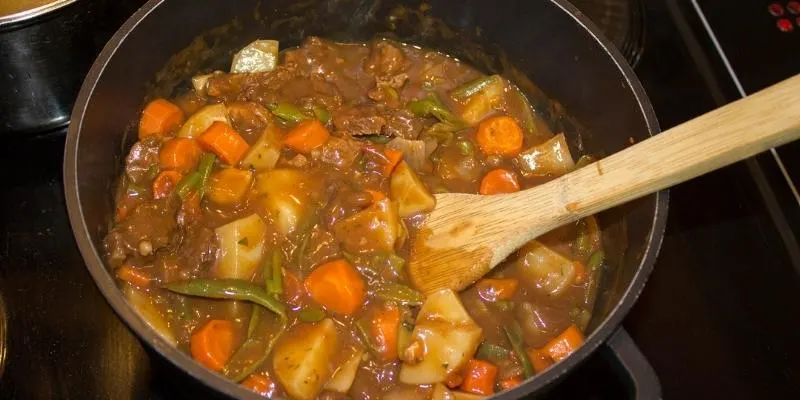A good pot of stew is always welcome, and if that’s what you’re craving for dinner then you’re likely incredibly disappointed when and if it turns out bitter. Luckily this is an opportunity to learn why this can happen in the first place, and how to fix it if it happened. So let’s take a look at why stew can sometimes turn out bitter, and what you can do about it. And also remember that some levels of bitterness can’t be helped much.
Why is my stew bitter ?
Stew can turn bitter if you’ve used too much tomato paste, burned the onions or garlic, if you’ve added too much red wine, and if you’ve used substandard olive oil. There was ways to fix this – mainly milk fat and/or sugar – but there are cases when the bitterness is too strong. Read on to see why stew can turn bitter, in more detail.
If you’re using tomato paste, it can get very bitter
If you’ve made stew with concentrated tomato paste, you might’ve added too much. Tomato paste is very, very strong and you don’t need too much of it in any sort of cooking. Usually 1 teaspoon is enough, 2 if you’re an avid tomato fan. The trouble is that tomato paste is so concentrated it’s often bitter on its own, and very, um, flat in flavor. It needs some help, with water and spices and oils. And a tiny bit of sweetness, which is usually lacking in the tomatoes used for tomato paste.
Do not fry tomato paste to remove the bitterness ! You only make it worse. Yes you need to cook off tomato paste’s harsh notes, but frying the paste in oil will only burn the paste, and turn it even more bitter. It’s better to add this in the liquid, in the last 30 minutes of cooking, so it has time to mingle with the rest of the ingredients but won’t burn.
Add it only in moderation (1-2 teaspoons, not tablespoons), since it is very concentrated, and make sure there’s plenty of liquid in the stew when you add it.
If your culprit is tomato paste, get yourself some tomato sauce instead. That’s a less concentrated but still flavorful sauce made with less tomato and some extra liquid, and aromatic herbs, with some veggies.
Read also: Why Is Stock Cloudy ? Does It Have To Be Clear ?
If you’re adding red wine, too much can turn bitter
Some recipes and some people like to add red wine to the stew. It adds a really nice hearty flavor, and pair very well with beef, pork, and tomatoes. But the thing is, you only need a little bit of wine. Too much wine meant too much tanning, the antioxidants and bitter notes in red wine.
So how much wine do you add to a stew ? Well let’s assume a 5 quart pot (roughly 5.5 liters), complete with stock, veggies, meat, any ingredients you like. For that starting amount you’d need 4-5 oz of wine, at most. By the time to stew is done cooking it will reduce by about 35% at least. Add your wine when you add your tomato paste (if any), in the last 30 minutes of cooking. Most of the alcohol will cook off.
This also applies if you’re using beer or ale instead of wine. Too much of it can turn the food bitter, and you also need to add that towards the end of the cooking.
Olive oil can have a very bitter taste if poorly made, or rancid
Not all meals are made with olive oil, that’s true, but some people love their olive oil. If you’re one of them, you might be using it in nearly everything, including your stew. While this is not normally an issue, it becomes an issue if the oil you use is sub-standard or it has gone bad. Unlike other cooking oil, olive oil keeps a trace of the olive’s bitterness, and once it goes off it turns very, very bitter. If you’ve got a bottle of olive oil, always taste a little on your finger to see if it went bad in the meantime.
And sometimes the olive is well within its use date, it’s not rancid, but it just tastes a bit bitter. This is usually poorly made olive oil, and I’ve covered why olive oil can be expensive but the quality lacking in this post here. The short answer is mixed origins for the olives used in the oil, and cutting costs. So your olive oil, even if it says ‘extra virgin’ and ‘cold pressed’ may still be of lower quality, which usually implies more bitterness.
Read also: Can You Overcook Soup ? Does It Get Better In Time ?
Burnt onions and garlic can turn very bitter
If you’ve decided to sautee the onions and garlic before adding anything else to the stew, you’ve very right to do so. Just be careful when doing this to use medium-low flame, otherwise you can easily burn the onions. Burnt onions will taste, well, burnt, and also get a bitter note. And if you’re adding garlic, it’s very fussy if you want to get its flavor just right. Only add it in the last 30 seconds of sauteeing the onions, right before you add the other ingredients+ water or stock. Garlic burns very fast, in a few seconds, so it’s better to put it in last otherwise it will also get bitter.
Some spices and herbs can turn bitter
Spices and herbs usually hold up very well in food, but there are some cases when they turn bitter. They were either off, or the amount you added was way too much. For example bay leaves offer great flavor, but they are meant to stay in the background. If you add too many, like an entire packet for a whole Dutch oven’s worth of stew, you’d get some bitterness. The same goes for rosemary, garlic can burn and turn bitter very quickly, and nutmeg will also get bitter or impart a flavor that may make you think the stew is bitter.
How to fix bitter stew
The point is to try and mitigate the bitterness through some fat and/or sugar. You have a few options, such as adding butter, parmesan, or heavy cream since those will tame most sharp flavors (acidic, bitter, and even spicy). Plain cooking oil won’t help, you need milk fat.
Another option is to try and sweeten it a little. This is an old trick, specifically used for tomato paste but will work for other ingredients. My mother always added a teaspoon of white sugar to anything with tomato paste – pasta sauce, stew, soup, beans, anything at all. I personally disliked the slight sweetness but it did offset the bitterness in tomato paste.
However if your stew is very bitter, you may need to combine the milk fat and sugar and just hope for the best. I ruined a perfectly good guacamole with a bit of olive oil I didn’t know turned bad. It was unbelievably bitter, inedible. There was no salvaging it. If your stew had the misfortune to turn so amazingly bitter, it might be too late.
That being said, I do hope these fixes can help you improve the stew, and you’ve also found the main culprit. Maybe it’s the tomato paste, maybe it’s the wine, maybe it was something else.


